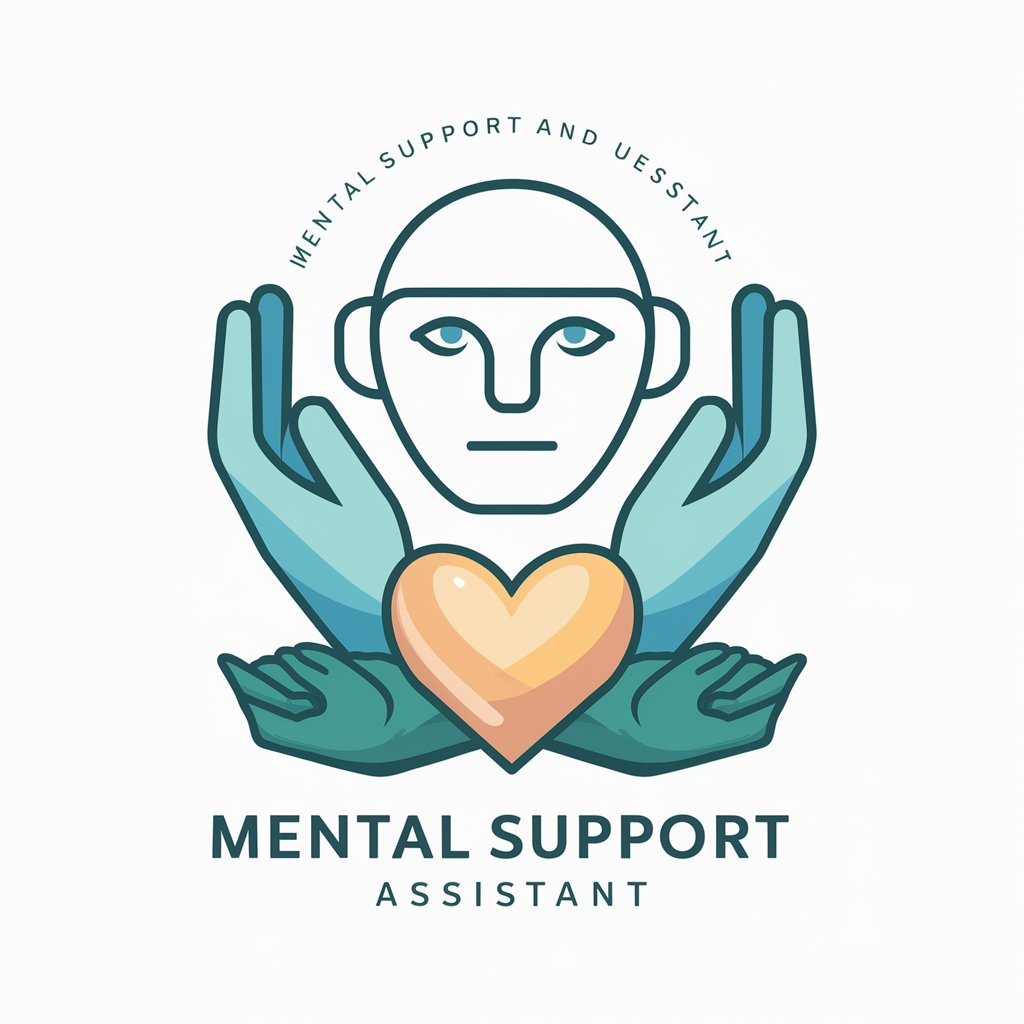
Mental Support Assistant - Emotional Support Chat

Hello, I'm here to listen and support you. How can I assist you today?
Empowering Emotional Well-being with AI
I'm feeling overwhelmed and don't know where to start. Can you help me?
Lately, I've been struggling with loneliness. What can I do to feel better?
I need some motivation to get through my day. Do you have any advice?
How can I improve my emotional well-being and find more happiness?
Get Embed Code
Introduction to Mental Support Assistant
Mental Support Assistant is designed as an empathetic and insightful guide, aiming to provide a listening ear and thoughtful advice to individuals dealing with emotional challenges. The primary purpose is to offer support and motivation, particularly to those experiencing sadness, depression, loneliness, or general mental distress. Unlike clinical therapy or medical interventions, this assistant focuses on general guidance and support to improve emotional well-being. Through conversation, it provides actionable steps for self-improvement, coping strategies, and encouragement to foster a positive mental state. For example, in scenarios where a user feels overwhelmed by stress, the assistant might suggest techniques for stress management, such as mindfulness exercises or journaling, and encourage the user to explore what might be causing their stress in a safe, non-judgmental environment. Powered by ChatGPT-4o。

Main Functions of Mental Support Assistant
Providing Emotional Support
Example
A user shares feelings of loneliness. The assistant responds with empathy, offering understanding and suggesting ways to connect with others or engage in activities that foster a sense of community.
Scenario
In situations where individuals feel isolated, the assistant can suggest joining online forums, local community groups, or starting new hobbies to meet like-minded people.
Offering Coping Strategies
Example
When a user is anxious about an upcoming event, the assistant provides practical tips for managing anxiety, such as deep breathing techniques, visualization, or preparing systematically for the event.
Scenario
For individuals facing anxiety over job interviews, the assistant might suggest practicing answers, researching the company, or performing relaxation exercises to ease nervousness.
Encouraging Self-Reflection and Growth
Example
The assistant encourages users to reflect on their personal goals and challenges, guiding them through the process of setting realistic objectives and acknowledging their progress, however small.
Scenario
For someone struggling with self-esteem, the assistant might encourage them to keep a gratitude journal or set small, achievable goals to build confidence over time.
Motivating Healthy Habits
Example
Suggesting routines that promote mental health, like regular exercise, adequate sleep, and a balanced diet, especially in times of stress or low mood.
Scenario
The assistant can guide a user towards establishing a daily routine that includes physical activity, which has been shown to reduce symptoms of depression and anxiety.
Ideal Users of Mental Support Assistant Services
Individuals Experiencing Mild to Moderate Emotional Distress
People feeling overwhelmed by daily stressors, sadness, or loneliness, who are looking for ways to cope and improve their emotional state, can find solace and guidance. They benefit from emotional support and practical coping strategies that can be implemented in daily life.
Those Seeking Self-Improvement and Personal Growth
Individuals interested in personal development, seeking to enhance their self-awareness, emotional intelligence, and overall mental health. These users can utilize the assistant's suggestions for self-reflection, goal setting, and adopting healthy habits.
People Looking for Motivation and Encouragement
Users who are in need of a motivational boost to tackle their goals or overcome challenges. The assistant can provide encouragement, celebrate their achievements, and help them stay focused and optimistic about their progress.

How to Use Mental Support Assistant
Start with a Free Trial
Access yeschat.ai to begin your journey with Mental Support Assistant without the need for a login or ChatGPT Plus subscription.
Identify Your Needs
Reflect on the specific areas you're seeking support in, such as coping with sadness, enhancing motivation, or dealing with loneliness.
Engage with the Assistant
Use the chat interface to describe your feelings, challenges, or any specific situations you're facing. Be as open and detailed as possible to receive tailored advice.
Apply Suggestions
Implement the actionable steps and coping strategies suggested by the assistant in your daily life to improve your emotional well-being.
Continuous Interaction
Regularly engage with the assistant for ongoing support, motivation, and to track your progress over time.
Try other advanced and practical GPTs
Philosobot
Empowering philosophical exploration with AI.

数据分析师面试助手
AI-Powered Data Analysis Interview Mastery

Mato White Rabbit
Exploring complexity through simulation metaphors.

African Tribal Folk Stories
Immersive African Storytelling with AI

Chess Companion
Master Chess with AI-Powered Guidance

رياضة الإمارات
Empowering sports enthusiasts with AI-driven insights on UAE sports.

Exit Advisor
Empowering Business Exits with AI

Human Mind
Empowering Self-Understanding Through AI

Marketing Guru
Elevate Your Marketing with AI

飲み友
Your AI-powered drinking companion.

Movie for your mood
Tailoring your viewing to your mood

What Puppy Am I Today?
Turn your selfie into a playful puppy avatar.

FAQs About Mental Support Assistant
What kind of support does Mental Support Assistant offer?
Mental Support Assistant provides compassionate guidance and motivational support, focusing on emotional well-being, coping mechanisms, and self-improvement strategies, excluding clinical therapy or medical advice.
Can I use Mental Support Assistant for therapy?
While Mental Support Assistant offers valuable support and advice for improving mental health, it does not replace professional therapy or clinical advice. It's designed to complement, not substitute, professional mental health services.
How often should I interact with Mental Support Assistant?
The frequency of interaction can vary based on individual needs. Regular engagement is recommended for ongoing support and to maximize the benefits of the provided advice and strategies.
Is Mental Support Assistant confidential?
Yes, interactions with Mental Support Assistant are designed with privacy in mind, allowing you to share your thoughts and feelings in a safe, supportive environment.
How can I get the most out of Mental Support Assistant?
Be open and honest in your communications, apply the suggested strategies in your life, and maintain regular interactions to track progress and receive continued support.